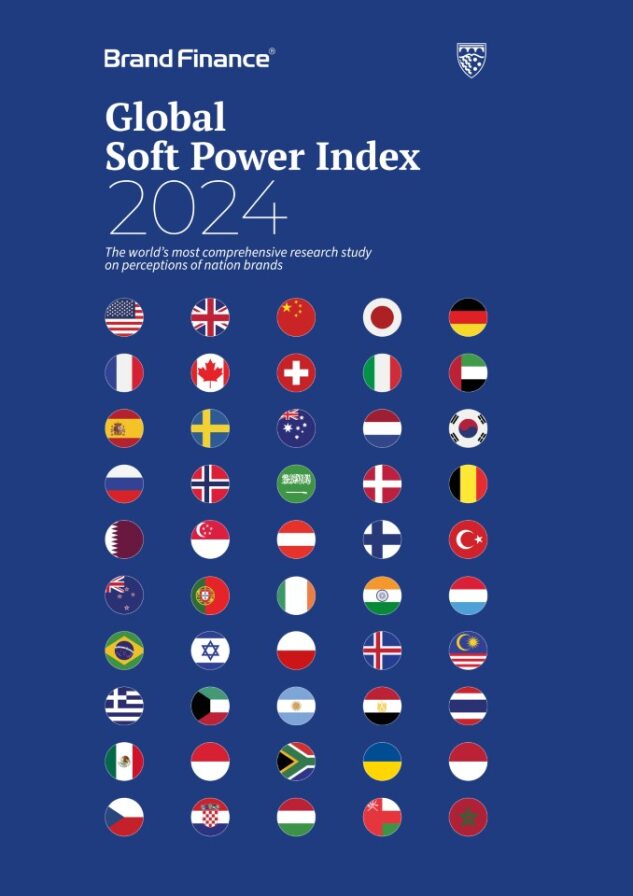This article was originally published in the Global Soft Power Index 2024

Publisher, Editor,
Company Chairman
& Broadcaster
Britain’s weaknesses are well-known and well-established, partly because of our national penchant for dwelling on them. Our strengths? We do not big them up nearly as much as we talk ourselves down. If we have next to nothing to say about our strengths, why should we expect foreigners to fill in the gap?
This emphasis on our weaknesses and ignoring or sidelining of our strengths has a deleterious effect on Brand Britain and our global reputation for Soft Power which, in turn, undermines our economic performance. If a country will not capitalise on what makes its nation brand and Soft Power strong, then it will lose out in global markets.
Other countries have long realised this. American Soft Power has long been synonymous with its global reputation for cutting-edge technology, especially digital technology. All the world’s digital tech giants are American. Only the Chinese have any rivals of scale, and they operate largely in their huge domestic market, whereas America’s high-tech is global.
Facebook, Google, Amazon, Apple, and many others are at the forefront of defining Brand America. It is self-reinforcing. If you have a global reputation for being the crucible for the latest developments in digital technology, then the rest of the world will beat a path to your door to develop their own digital breakthroughs. It explains why so many of America’s digital developments have been spearheaded by migrants.
Or take Germany. For decades its brand has been synonymous with precision engineering, which at one stage made Germany the largest exporter in the world. German cars and machine tools captured markets across the globe, their reputation for quality and reliability unrivalled, which meant they could charge premium prices. It was once said back in the 1950s that what was good for General Motors was good for America. In more recent times what was good for Mercedes or BMW or Audi was good for Germany.
France has also fostered what makes its Soft Power and nation brand unique. It is the luxury goods capital of the world. Indeed, there are more French luxury brands with global appeal than the rest of the world put together. It is now a key component of what makes Brand France special in the eyes of the world. It has helped make France a prominent tourist destination. It generates billions of euros for the French economy.
America, Germany, and France — to give just three examples — have all capitalised on their strengths to build their brands and project Soft Power. In the process, it has generated great wealth and global respect for their economies. So, what is the equivalent for Britain?
Some, rather despairingly, might suggest the Monarchy or the House of Lords as vital contributors to Brand Britain. To some extent they are. They help define what makes Britain distinctive, even unique. But they are essentially backward looking, products of our history. They are quaint — good for the tourist trade — rather than huge engines of economic generation. You could even argue that they undermine Brand Britain in the 21st century by reinforcing the idea that we live in the past and that we are not fit for purpose in the modern world.
What — if anything — is the British equivalent of American digital technology, German industrial might, or French luxury? In a word, it is services. Yes, services, from finance to consultancy, legal to business, accountancy to insurance, architectural to audio-visual to education. Some of it is not very glamorous. A lot of it you cannot even see. But taken together they make Britain a global services superpower. Indeed, after America, we generate and export more services than any other country in the world.

The manufacturing industry is never going to return to its former glory. Yes, we will continue to make things, mainly at the very top, expensive end of the market with high-value-added, such as Airbus wings, Rolls Royce aero engines, BAE Systems defence products, Range Rovers, and Jaguars. But it is not going to take a bigger share of our economy. Not at our stage as an advanced economy. That is happening nowhere, not in France, Italy, or America. Germany’s emphasis on industrial products is sui generis.
It is also in decline. Germany’s heyday as an industrial powerhouse is over, and its economy is now in clear secular decline. China is the new workshop of the world. In many sectors — such as EVs, batteries, solar panels, and wind turbines — it has massive overcapacity, which means it is now flooding the world with low-price, high-quality industrial goods with which the rest of the world cannot compete. Even Germany, whose car industry is contracting and whose solar panel industry has disappeared.
Compare that with the growing demand for the kind of services Britain is a world leader in providing. Even China’s appetite for services is growing. The more developing economies advance, the more their appetite for services grows. And keep in mind that Brexit had little impact on services because the single market in services remained undeveloped.
Services and Soft Power go hand in hand. Let me finish with just one example. British legal services now generate several billions of pounds in export revenues. Nobody would have thought that even possible only a few decades ago. But the reputation of our legal system for fairness, independence, and incorruptible judges — part of our Soft Power appeal — has made English common law the default system under which many major commercial contracts, even those that do not involve UK companies, are now signed. It started because a key element of our Soft Power was the legal system. The more it expands, the more our brand and Soft Power are enhanced. It is self-reinforcing.
In a difficult, dangerous world in which we let too many of our weaknesses fester, we need to recognise what we are good at, and make it even more so. Brand Britain needs to become as synonymous with high-quality services as America is with high-tech, France with luxury, and Germany once was with great cars. This is the massive opportunity now staring Britain in the face, if only our political and media elite had the nous to see it.

